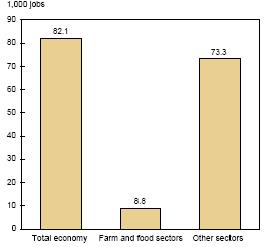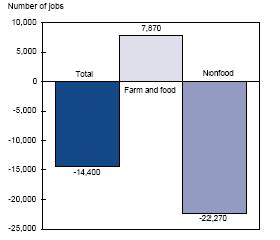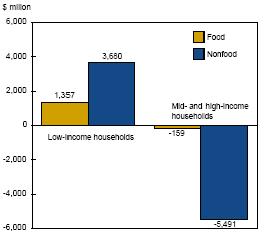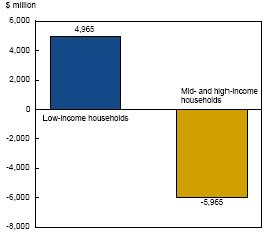Abstract
The Food Stamp Program is one of the largest federal programs that has been adopted in 1961 to be implemented in its’ present form in 1977. The research provides an overview of the Food Stamp Program. Firstly, historic background of the program is provided with the major historic trends. The focus of the paper is then shifted to objectivity of the goals set by program and whether it is actually possible to live up to the minimum provided. The research paper addresses fraud issues and prevention programs in place. The overall impact of the program on economy is then assessed including job perspectives, consumer spending, an increase in demand, and the effect on income of low, middle, and high classes. Finally, the concluding remarks about overall effectiveness of the program are made.
The Food Stamp Program
The Food Stamp Program, the largest federal program which provides basic food assistance, has become a real savior for millions of people. This program is generally considered to be one of the largest elements of social safety net. For the first time, the idea of this program was applied in the late 1930s; however from 1939 to 1943 it was rather limited, then in 1961 The Food Stamp Program was reviewed and finally became a pilot program, later extending nationwide. The current structure of The Food Stamp Program was implemented in 1977, containing a specific goal. This goal was to help the hungry and needy by having low-income households to provide higher level of nutritious diet by using normal channels of trade.
Over the years The Food Stamp Program became one of the largest humanitarian programs in the U.S. In 1998 this program was helping over 19.8 million people each month which made approximately 7.3 percent of all Americans. During this year the needy received a significant amount of humanitarian help, which constituted over $16.9 billion, including monthly benefit of $71 per person. In 2003 the rate of participation level was significantly increased, covering over 21.26 million of individuals. One of the main reasons of increasing number of participants in The Food Stamp Program is its ability to respond effectively to national, state, and local economic changes and emergencies.
Eligibility for the program is based on financial and non- financial factors, which effected the final decision whether to support individual or not. To become a participant of The Food Stamp Program one has to go through rather long, but worthwhile application process. During this process one has to complete and fill in an application form, to be interviewed, and to verify facts crucial to determining individual’s eligibility. After successful completion of this stage if a household meets the eligibility requirements, he or she is usually qualified for receiving desirable benefits. In case if an applicant is legal immigrant this person has to be legally resided in the United States for at least 5 years in order to continue the process of qualification. Otherwise, a household would be considered ineligible for receiving food stamp benefits.
The definition for the household is a person or some group of people living together. These people may not necessarily be relatives, however they are ought to purchase and prepare food together. To qualify for the program, a household, except for those members with elderly or disabled people, must have a gross income below 130 present of the official poverty line, including net incomes below the poverty line. To clarify meaning of the term “gross income”, it should be said that net income is a gross income minus some dedications. These dedications include a standard deduction, a deduction for part of any income earned in the labor market, a deduction for certain housing expenses, and some other deductions. Usually households possess about $2,000 of such resources like, as checking/savings account, stocks/bonds, cash, e.g. If household has at least one disabled member or a member with age of 60 or older, the household can possess to $3,000 in resources. Today, the benefit average provided by The Food Stamp Program is abut 90 cents for a meal per person.
The benefit level in The Food Stamp Program depends on the net income of the current household. In case of household who does not have any source of income, after paying the necessary deductions, this program will provide a sufficient amount of benefit for purchasing necessary volume of foods, which is described by the U.S. Department of Agriculture’s Thrifty Food Plan.
The benefits which one receives from The Food Stamp Program are allowed to be used only for purchasing food and nonalcoholic drinks. 100% of the program’s benefits are being paid by the federal government, which contribution constitutes up to 50 percent.
The target for The Food Stamp Program is the neediest people, in particular in 2003 out of all food stamps households, 55 percent of them included children. These households receive 79.3 percent of all food stamp benefits. Besides that, about 18 percent of all households involved in the program include an elderly person, and about 23 percent – a disabled person in the household. The gross incomes of the 88 percent of the participants of the program are below the poverty line, and 38.4 percent of all food stamp households have their gross incomes even below half of the poverty line.
Food Stamp: Living up to the Minimum
As it was said above, the Food Stamp Program provides the minimal benefits for those who have opportunities of avoiding starving and hunger. Is it possible to survive for a person whose only income for food is his or her benefit from the Food Stamp Program? There are many famous people who have taken on themselves “food stamp challenge”, trying to live out of the food stamp budget. One of them is Robert Waldrop, President of the Oklahoma Food Cooperative, who together with his wife decided to eat for a week on a food stamp budget. They had $61.87 per two people per week, which constituted only $8.84 per day.
The conclusion of their experiment was evidence that it is possible to live only out of the food stamp budget. At the end of the week Robert Waldrop and his wife found that the total amount that they spend on food was $60.43 or, in other words, they had come in under budget. Also they had at least 2 more meals of leftovers in their fridge and apple pie in the freezer. In spite of the fact that the food from the local farmers is more expensive, Robert and his wife decided to purchase as much food as they could from local farmers. By doing so, they have proved that one can not only survive out of food stamp budget, but also have very healthy meals. By the end of the trial week they saved $1.44. They bought 73% of the whole amount of food from the local farmers and 27% from supermarkets.
The “Food stamp challenge” has become evidence that The Food Stamp Program is a real support for people in need.
Food Stamp Fraud and the Electronic Benefits Transfer (EBT)
A great majority of about 19 million Food Stamp Program participants, going through application filling process, provide accurate and real information concerning their eligibility and as a result, receive and use the benefits legitimately. However, there are fraudulent activities of some applicators and retailers, which have tainted the image of the food stamp program. There are two types of fraudulent activities that harm the Food Stamp Program: the first one is providing false information about eligibility, and the second is misusing food stamp coupons, which is also called “trafficking.”
The integrity of the program is undermined when the food stamp trafficking is present, taking away benefits from those who really need them. The program has strong penalties for those who use the system of trafficking to deceive the system. Those retails and recipients who are involved in such illegal acts will be prosecuted and disqualified from the program. There are some systems in the food stamp program that help to prevent trafficking, for example one of them is Electronic Benefit Transfer (EBT).
Electronic Benefit Transfer (EBT) is an electronic system that allows a recipient to authorize transfer of their government benefits (such as food stamps budget) from a Federal account to a retailer account to pay for products received. Electronic Benefit Transfer has been implemented in US since 2004. So, today this system is being used to issue food stamps and some other benefits in many states of the USA.
Electronic Benefit Transfer system provides much help in preventing trafficking. It makes this process more easy, smooth, and quick. EBT changes the paper coupon system and replaces paper coupons with a benefit card, which is very similar to a bank card. This card is to be used by recipients for food purchasing at the places where they shop. Access to the card requires “Personal Identification Number” which makes the card more protected for taking advantage of it for trafficking. Also, since the card would provide access to the benefits of the entire month, recipients are most likely to be unwilling to trade it. In addition, Electronic Benefit Transfer significantly improves the ability of the system to detect acts of trafficking by creating electronic reports. EBT system is currently being used for more then seventy percent of all food stamp households.
Food Stamp Program: Economic Effects
Then it comes to speaking about economic effects of the program, the results are somewhat dualistic. Hypothetically, annual expenditures as a result of food stamp program increase by $5 billion annually. In this case, the funds are being borrowed from the financial market net of private investment. The stated increase then results in $1.3 billion increase on food items by the recipients of the financial aid. As a result of an increase in expenditures on non-food items, there in annual increase of $3,7 billion in non-food sector of economy. Consequently, the demand for both food and non-food items also increases. To be more precise, expenditures of $5 billion on Food Stamp Program resulted in an increase of $9,2 billion in total economic a ctivity including sales, production, and value shipment, whereas an increase in jobs accounts for the total of $82,100. As a result of implementation of the program, the two sectors – farm and food processing, gained as much as $8,800 jobs, which is the growth of 0,22 percent.

The figures below visualize the overall impact on economy of the Food Stamp Program. As presented in Figure 1, the number of jobs increased by 82,100 in economy overall, with 73,300 being from other sectors and 8,800 from farm and food sectors. It should pointed out, that the number of jobs actually decreased, as showed in Figure 2.

To be more precise, the number of jobs increased only in food and farm sectors.

Figure 3 shows the shift in spending on food and nonfood items by low, mid and high income households. While the expenditures in low income households increased both in food and non-food sectors, expenditures in mid and high income households increased.

Figure 4 shows the effect of the Food Stamp Program on the income of low income and high and mid income households. It should be pointed out, that the income of poor population did not increase by the full amount and yet it decreased even more than that for mid and high income households.
Conclusion
The effects of the Food Stamp Program on economy are dualistic; on one side, it provides a relief to those in need and actually increases consumer spending which provides a necessary push to the economy by increasing the level of demand. However, when it comes to speaking about mid and high income households, the situation is reversed, as both expenditures and net income decrease. Yet, when it comes to speaking about more human rather than economic goals that the program has, the Food Stamp Program is definitely very successful.
Bibliography
Articles
Bost, E. M. Challenge Equals Opportunity: Food Stamp Reauthorization. Policy & Practice of Public Human Services, 59(4), 2001.
Food Stamps. Social Security Bulletin. 2002.
Wilde, P. E., & Andrews, M. S. The Food Stamp Program in an Era of Welfare Reform: Electronic Benefits and Changing Sources of Cash Income. Journal of Consumer Affairs, 34(1), 2000.
Ziliak, J. P., Gundersen, C., & Figlio, D. N. Food Stamp Caseloads over the Business Cycle. Southern Economic Journal, 69(4), 2003.
Butler, J. S., & Raymond, J. E. The Effect of the Food Stamp Program on Nutrient Intake. Economic Inquiry, 34(4), 1996.
Books
Hershkoff, H., & Loffredo, S. The Rights of the Poor: The Authoritative ACLU Guide to Poor People’s Rights. (Carbondale, IL: Southern Illinois University Press: 1997).
Maurer, D. & Sobal, J. (Eds.). Eating Agendas: Food and Nutrition as Social Problems. (New York: Aldine de Gruyter: 1995).
Peterson, P. E., & Rom, M. C. Welfare Magnets: A New Case for a National Standard. (Washington, DC: The Brookings Institution: 1990).
Sims, L. S. Food and Nutrition Policy in America Food and Nutrition Policy in America. (Armonk, NY: M.E. Sharpe: 1998).
Steiner, G. Y. The State of Welfare. (Washington, DC: Brookings Institution: 1971).
Websites
Federal Food Programs. Food Stamp Program.
Robert Waldrop. Meeting the food stamp challenge with local foods.
Food Stamp Program Briefing Rooms.
DHS Food Stamp Program.